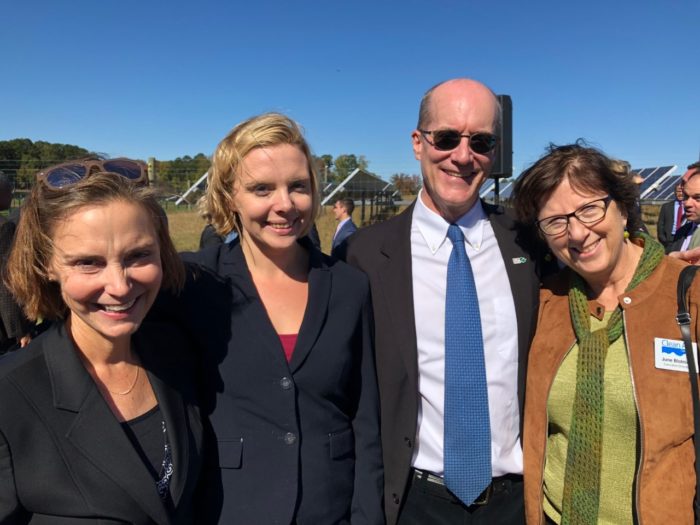Tar Heel born and Tar Heel bred: Meet Mary Maclean Asbill, Director of SELC’s North Carolina Offices
With Senior Attorney Derb Carter’s decision to step down from the role, SELC’s North Carolina offices have a new director. We are delighted to give our supporters the opportunity to get to know more about Mary Maclean Asbill, who will oversee SELC’s Chapel Hill and Asheville Offices.
Her list of accomplishments at the organization includes leading legislative work in the North Carolina General Assembly and lobbying state officials on issues including water quality, coal ash, offshore drilling, industrial hog operations, and renewable energy.
A native of Greensboro, Asbill graduated from the University of North Carolina at Chapel Hill in 1989 and from the University of Georgia School of Law in 1993. In 1999, she became the first staff attorney in SELC’s Atlanta office. There she worked on cases focused on water and forestry issues. After pursuing a few other opportunities in environmental law, she rejoined the organization as a Senior Attorney in the Chapel Hill office in 2011. Since then, she hasn’t looked back.
Asbill has developed strong connections with the broader North Carolina environmental community and has been a driving force behind SELC’s diversity, equity, and inclusion work as co-chair of our Key Committee. In her new role, she will lead SELC’s Chapel Hill and Asheville offices.
What do you love about working at SELC?

Experiencing the gratitude that clients and partners feel when we help them reach their goals. Time and time again, I’ve just had the nicest calls and messages from our people and I think that’s the best part.
Why is North Carolina’s work on tackling climate change so important?
For one, the size and ecological importance of our North Carolina coast. We stand to lose so much to climate change and sea level rise. From a carbon perspective, North Carolina is such fertile ground. We have the potential to work with a forward-thinking governor to enact policies that will reduce carbon and make North Carolina a leader in fighting climate change. We also have so much solar energy to harness here that we can serve as a model for other states.
Talk about a recent win in North Carolina and how it was achieved.
We’ve had a couple of important wins recently on limiting the industrial contaminants, or ‘forever chemicals’ being discharged into our waterways. Attorneys and staff have made a lot of progress by putting legal pressure on Chemours, a polluting facility on the Cape Fear River. The strategy we used there was built upon the strategies we used cleaning up coal ash and it has led to some national movement from the EPA on cleaning up these chemicals. It’s sad that we’ve found them in such large quantities, but to look on the bright side, it has helped SELC become a leader on studying industrial contaminants and will hopefully prevent some problems in our other states.

Favorite time of year?
College basketball season. I’m Tar Heel born and Tar Heel bred.
Mountains or ocean?
Ocean! Specifically Emerald Isle, where I grew up going to the beach.
When you go outside for a breath of fresh air, where do you go?
I like to go to the Eno River State Park. The river, swimming holes, and hiking trails are very convenient to anybody in the Triangle. (The Triangle refers to North Carolina’s “Research Triangle,” comprised of Raleigh, Durham, and Chapel Hill.)
Who do you look up to?
Trailblazers like Ruth Bader Ginsburg. I also look up to my predecessor at SELC, Derb Carter, for his creative legal thinking and perseverance in fighting the tough fights.
What’s one thing folks can do to help ensure a healthy environment for all North Carolinians?
Drive less. And help SELC advocate for better public transportation.
